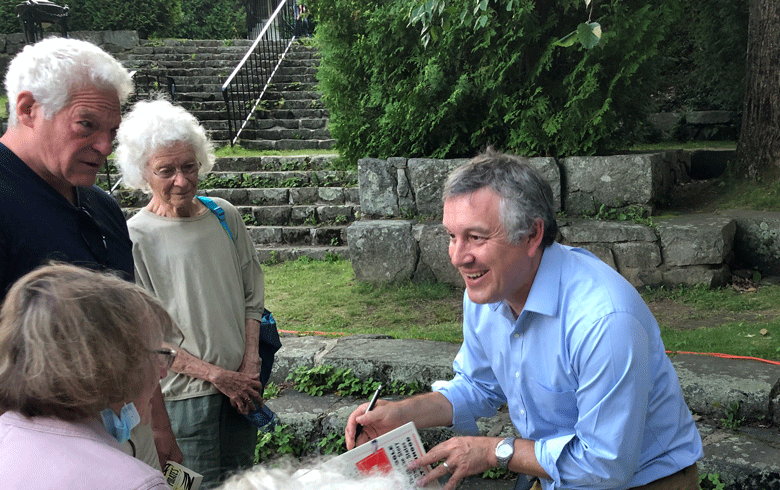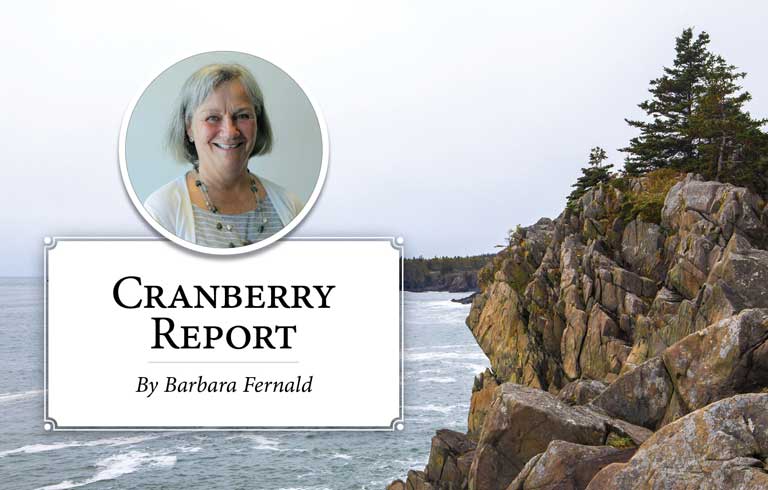Six months to the day after supporters of President Trump stormed the U.S. Capitol, Colin Woodard stood on the grass of Camden Public Library’s amphitheater, looking over the harbor where the late afternoon sun bathed boats in a golden glow.
The idyllic scene was a long way from the chaos in the capital, but the Jan. 6 attempted insurrection was on Woodard’s mind during his July 6 talk about his latest book, Union: The Struggle to Forge the Story of United States Nationhood.
In response to a comment from someone in the audience, Woodard ruefully joked that Jan. 6 “was good for the book,” which was published in 2020, “but bad for the nation.”
For the new nation to inspire loyalty “requires a credible, compelling story.”
Union explores how the U.S., a collection of disparate regions that coalesced around the struggle to end their colonial status, finally came to embrace a narrative about itself. That story, Woodard asserts, was powerful enough to stir pride and passions that blurred reality.
The theme of the book builds from 2011’s American Nations, in which Woodard delineates and describes 11 regions that fall roughly within the U.S. boundaries. Each region, he argues, had ethnicities, religions, and political and class values distinct from other regions.
The regions “had no idea they were going to end up in the same [nation],” he said. “They wound up together in a strange accident of history. They lacked a shared political heritage, and no shared story.”
But that fractured beginning later was “papered over by a story that we had a common past.” For the new nation to inspire loyalty to the point of giving one’s life to defend it, Woodard said, “requires a credible, compelling story.”
Citizens of this new nation might get an origin story from a scholar or from a demagogue, “but get it they will.”
Union gathers five biographies of those who created the American story.
There’s George Bancroft, a historian from Worcester, Mass., who, at age 17, was sent to Germany to study. He observed that the regions of that country had merged into a single nation, and he was “immersed in European ideas of nations.”
Bancroft wrote a history of the U.S. in the 1830s. “It was an absolute sensation,” Woodard said, tracing history from Columbus to the Constitution. God had chosen this new nation, Bancroft argued, and Woodard noted that “a reader of his book”—presumably President James Polk—”would later call this ‘Manifest Destiny.’”
William Gilmore Simms, a best-selling novelist from South Carolina, countered that story, writing that “No, Jefferson was wrong,” all humans were not equal. “Slavery is a good,” and America is a “classical” nation like Greece and Rome where it was acceptable to have a ruling class.
And both earlier narratives were countered by a man born a slave who later became a gifted, persuasive speaker—Frederick Douglas. He accepted the lofty values Bancroft attributed to the nation but argued “We haven’t achieved them.” That understanding continues, Woodard said. “You hear it echoed in speeches to this day.”
A fourth vision emerged through an early 20th century president.
“Woodrow Wilson was deeply committed to the ideas of white supremacy,” Woodard said, and screened the racist revisionist film Birth of a Nation in the White House for his Cabinet and the chief justice of the Supreme Court. The film, released in 1915, “inspired a second wave of the KKK.”
It was in this era that pride in the failed Confederacy bloomed; the statues being removed today were erected in those years, he said.
Finally, Frederick Jackson Turner of Wisconsin argued that “The West and Midwest created America.” The crude and harsh environment of the frontier helped create true Americans, Turner wrote in the early decades of the 20th century, and he tried to use demographic data to support his “Frontier Thesis.”
Woodard said he had reviewed Turner’s notes on census data that showed Turner trying to controvert facts that contradicted his thesis.
Are we destined to achieve our ideals as a nation? No, Woodard concluded. “We have to do the hard work to get there.” A more accurate, less romanticized story competes with the myth of American exceptionalism, he said, and it’s “a battle over the soul of the nation that continues today.”





